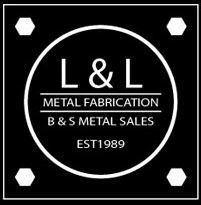Aluminum
ALUMINUM
In high-purity form, aluminum is soft and ductile. Most commercial uses, however, require greater strength than pure aluminum affords. This is achieved first by the addition of other elements to produce various alloys, which singly or in combination impart strength to the metal.
Aluminum Products: Beams, Angles, Channels, Bars, Tees, Plates, Floor Plates, Sheets, Tubing, Expanded Metal, and Bar Grating.
GUIDE TO SELECTION - ALUMINUM SHEET/PLATE
1100 – Commercially pure aluminum (99.00% minimum. Excellent corrosion resistance, workability and weldability; high thermal conductivity. Tensile strength range 14 to 24 KSI. Uses include deep drawing, spinning, sheet metal work, decorative and architectural applications, air ducts, names plates, fan blades, etc. Conforms to AMS QQ-A-250/1 and ASTM B209.
3003 – Alloyed with 1.2% manganese to provide a tensile strength range of 17 to 30 KSI. Excellent workability, weldability, and corrosion resistance. Used for drawing, spinning, fuel tanks, sheet metal work, and other application where slightly higher strength than 1100 is required. Conforms to AMS QQ-A-250/2 and ASTM B209.
5005 – Alloyed with .8% magnesium. Tensile strength range 18 to 30 KSI. Excellent workability, weldability, and corrosion resistance. Specified for applications comparable to 1100 and 3003 – where anodizing is required. Anodized finish matches that of architectural alloy 6063. Conforms to Federal specification ASTM B209.
5052 – Alloyed with 2.5% magnesium. Tensile strength range 31 to 44 KSI. Very good corrosion resistance, good workability, weldability, and strength. Used for aircraft fuel tanks, storm shutters, refrigerator liners, utensils, electronic mounting plates and panels, fan blades, etc. Conforms to AMS QQ-A-250/8 and ASTM B209.
5083 – Alloyed with 4.45% magnesium, 0.65% manganese and 0.15% chromium. Tensile strength range: 40 to 59 KSI. For use in structures requiring high weld efficiency for maximum joint strength – plus light weight and corrosion resistance. Applications: marine components, truck bodies, construction equipment, tanks, structural towers, drilling rigs, cryogenic applications, etc. Conforms to ASTM B209 and AMS QQ-A-250/8 and ASTM B209.
5086 – Alloyed with 4.0% magnesium, .45% manganese and 0.15% chromium. This alloy has a typical tensile strength range of 40 to 54 KSI. It offers resistance to stress corrosion and superior resistance to atmospheric corrosion plus good general workability. Applications include tanks (stationary, trailer, and rail-car), marine components, and welded assemblies of all kinds. Conforms to AMS QQ-A-250/7 and ASTM B209.
5454 – Alloyed with 2.7% magnesium, 0.8% manganese and 0.12% chromium. Tensile strength range 36 to 47 KSI. Good formability, weldability, and corrosion resistance. Uses include pressure vessels (ASME code approved for up to 400 degrees Farenheit), tanks dump truck bodies, welded structures, etc. Conforms to AMS QQ-A-250/10 and ASTM B209.
2024 – Alloyed with 4.5% copper. Tensile strength range 30 to 63 KSI. Fair workability and corrosion resistance. Forming operations are limited. Used for high strength structural and aircraft applications. Also available in Alclad for improved corrosion resistance, 2024 conforms to AMS QQ-A-250/4 and ASTM B209.
6061 – Alloyed with 1.0% magnesium and .6% silicon. Tensile strength range 20 to 42 KSI. Good formability, weldability, and corrosion resistance. Used for engineering and structural applications, boats, furniture, transportation equipment, etc. Conforms to AMS QQ-A-250/11 and ASTM B209.
7050 – Alloyed with zinc (5.7%-6.7%), copper (2.0%-2.6%), and magnesium (1.9%-2.6%) to offer superior strength, stress corrosion resistance, and toughness. Stocked in T7451, a temper intermediate to T3 and T76. Used in aircraft and missile applications. Conforms to AMS 4050, MMS 1420, BAC 5439 Class A, BMS 7-323, and MIL-STD 2154.
7075 – Heavily alloyed with zinc with lesser amounts of magnesium, copper, and chromium. One of the strongest of the aluminum alloys, its use parallels that of 2024 with 7075 selected when higher mechanical properties are desired. Forming operations are limited. Also available as Alclad for improved corrosion resistance. All 7075 flat products conform to ASTM B209; 7075 Bare conforms to AMS QQ-A250/12, Alclad 7075, AMS QQ-A-250/13.
QC-7 – This high-strength aluminum alloy is fully heat treated and stress relieved. It has outstanding thermal conductivity along with high strength and surface hardness, and as such it is suitable for polishing and texturing. Used in production injection molds, blow molds, structural foam molds, RIM molds, and aluminum die sets, it is weldable and highly machinable. Conforms to ANSI H35.2.

ABOUT US
We are proud of our longstanding commitment to innovation and providing quality customer metal fabrication and finishing services for an extensive range of applications and industries. L and L Metal Fabrication offers unique design build services to expedite the installation of your custom metal products and equipment.”
Copyright © 2019 L&L Metal Fabrication
Designed and Developed by Freedom Digital Solutions
All Rights Reserved | Privacy Policy